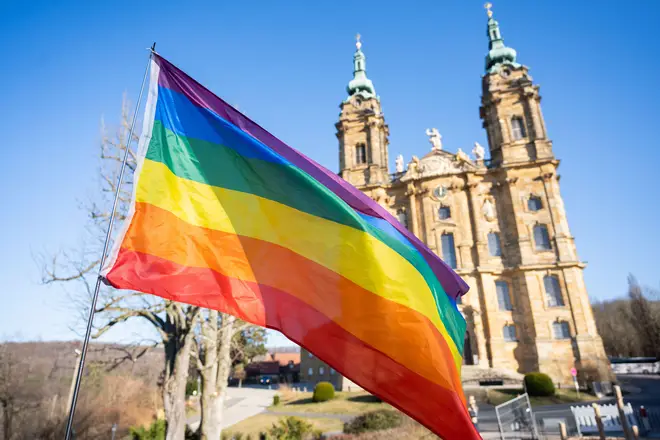
Clive Bull 1am - 4am
15 March 2022, 13:33 | Updated: 16 March 2022, 11:18

The ban on same-sex marriages in Bermuda and the Cayman Islands has been upheld as constitutional, judges in the UK have ruled.
Activists supporting same-sex marriages in the Cayman Islands and Bermuda received a heavy blow after the UK's Privy Council sided with the government of Bermuda.
The Privy Council, which serves as the final court of appeals for several islands in the Caribbean, upheld the ban in a ruling on Monday.
It reached the Privy Council after the Bermuda government fought a local Supreme Court's decision to allow gay marriage.
Read more: Methodist Church to allow same-sex marriages to take place in 'momentous step'
Read more: 'I voted against love': Nadine Dorries shares regret voting against gay marriage
One of five judges in the Bermuda case dissented.
British judges, Lords Reed and Hodge, Lady Arden and Dame Victoria Sharp, backed the ban.
Lord Sales was the only judge to dissent.
In May 2017, the island's Supreme Court ruled that same-sex marriages were legal, but the party that won the general election months later rejected that ruling and allowed only domestic partnerships.
One senator said during the debate at the time: "Society largely does not support same-sex marriage nor is it prepared to accept it at this time."
The issue bounced through various courts until it reached the Privy Council.

British judges have ruled that Bermuda’s ban on same-sex marriage is permitted
Local activist, Leonardo Raznovich, said he plans to fight the Privy Council's decision to uphold the ban.
He told the Associated Press he was "in shock" and described the ruling as an "affront to human dignity".
The Privy Council acknowledged that the historical background of marriage is "one of the stigmatisation, denigration and victimisation of gay people, and that the restriction of marriage to opposite-sex couples may create among gay people a sense of exclusion and stigma".
However, it said that "international instruments and other countries' constitutions cannot be used to read into (Bermuda's constitution) a right to the legal recognition of same-sex marriage".
Billie Bryan, founder and president of Colours Cayman, an advocacy group supporting the LGBTQ community, said the Privy Council has "done nothing more than reassert the oppressive political environment of yesteryear".
The London judges also ruled unanimously that gay people do not have the right to marry in the Cayman Islands based on its constitution.
Caribbean activists had hoped for a favourable ruling to help sway public opinion in a largely conservative region where colonial anti-sodomy laws remain on the books and same-sex marriage is rarely considered a right.
However, judges wrote that "the effect of the board's interpretation is that this is a matter of choice for the legislative assembly rather than a right laid down in the constitution".
The Cayman Islands case reached the Privy Council after two women - Chantelle Day and Vickie Bodden Bush - were denied a marriage licence in 2018.
Read more: UK 'leads the charge' in demonising trans people, Natasha Devon declares
The couple went to court, and in March 2019, the Cayman Grand Court ruled in their favour after stating that the denial violated the law.
Months later, a local appeals court overturned the decision, stating that the Cayman constitution does not allow for same-sex marriage.
However, it ordered the government to provide the women with a legal status equivalent to marriage.
Mr Raznovich said that did not happen, and so the legal team sought a ruling from the Privy Council in London.
The case has riled some in the Cayman Islands, where several legislators accused of being homophobic sought to have Mr Raznovich deported several years ago.
While the British territory of nearly 70,000 people is considered to be socially conservative, Mr Raznovich noted that the premier gave a speech last year during the gay pride parade.
"(It) was historical," he said.
"That has to be highlighted as a great step in the right direction."
However, he and Bryan noted that much work remains to be done, and that the premier's actions were not necessarily representative of the island's government.
"I think people are more receptive to what we're trying to achieve, but there's still a lot of stigma," Bryan said.